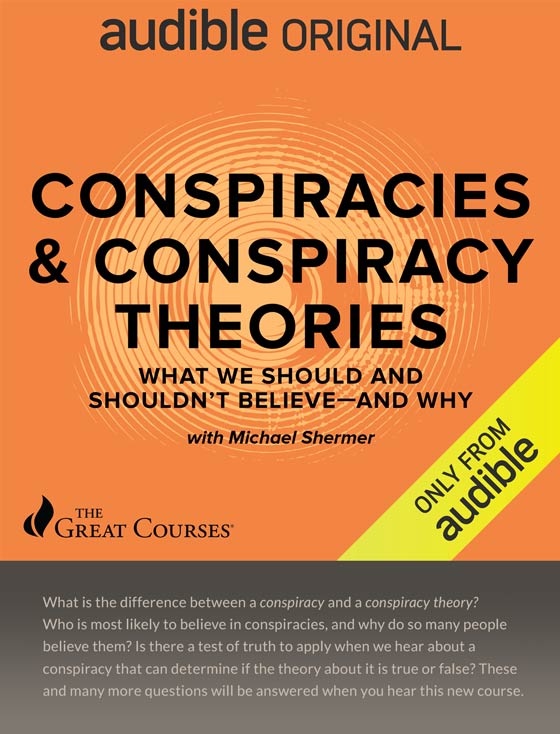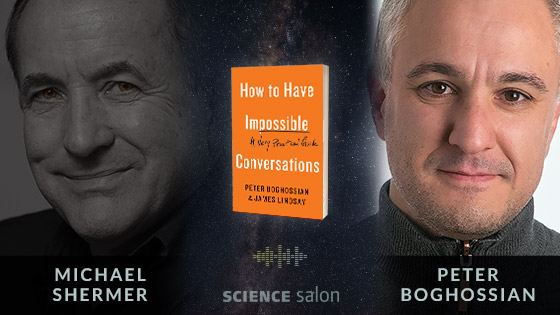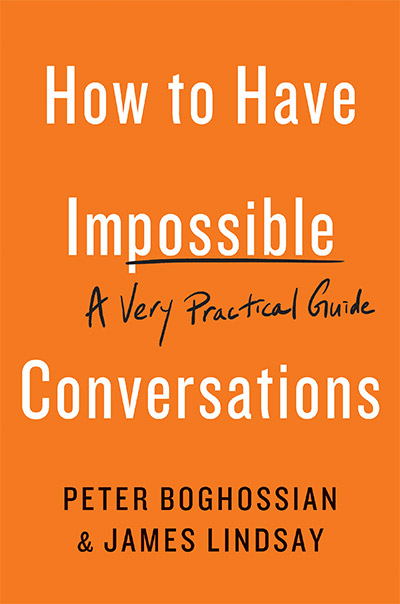CONSPIRACIES & CONSPIRACY THEORIES
What We Should and Shouldn’t Believe—and Why
A New Audible Original Course by Dr. Michael Shermer
Audible Inc., the world’s largest producer and provider of downloadable audiobooks and other spoken-word entertainment, in conjunction with The Great Courses, is creating audio-only, non-fiction content for Audible’s millions of listeners. The first three titles include Dr. Michael Shermer’s new and original course on: Conspiracies & Conspiracy Theories: What We Should Believe and Why.
Brief Course Description
What is the difference between a conspiracy and a conspiracy theory? Who is most likely to believe in conspiracies, and why do so many people believe them? Is there some test of truth we can apply when we hear about a conspiracy that can help us determine if the theory about it is true or false? In this myth-shattering course, world-renowned skeptic and bestselling author Dr. Michael Shermer tackles history’s greatest and widespread conspiracy theories, carefully deconstructing them on the basis of the available evidence. In the current climate of fake news, alternative facts, and the rise of conspiracy theories to national prominence and political influence it is time to consider how to distinguish true conspiracies (Lincoln’s assassination, the Pentagon Papers, Watergate) from false conspiracy theories (Sandy Hook, 9/11, fake moon landing). You learn how conspiracies arise, what evidence is used to support them, and how they hold up in the harsh light of true historical, even scientific analysis, as well as why people believe them. Illuminating and compelling, the next time you hear someone talking about a conspiracy theory, this course just may give you the detective skills to parse the truth of the claim.
Conspiracies & Conspiracy Theories consists of 12 lectures, 30-minutes each.
PART I
Conspiracies & Why People Believe Them
- The Difference Between Conspiracies and Conspiracy Theories
- Classifying Conspiracies and Characterizing Believers
- Why People Believe in Conspiracy Theories
- Cognitive Biases and Conspiracy Theories
- Conspiracy Insanity
- Constructive Conspiracism
PART II
Conspiracy Theories & How to Think About Them
- The Conspiracy Detection Kit
- Truthers and Birthers: The 9/11 and Obama Conspiracy Theories
- The JFK Assassination: The Mother of All Conspiracy Theories
- Real Conspiracies: What if They Really Are Out to Get You?
- The Deadliest Conspiracy Theory in History
- The Real X-Files: Conspiracy Theories in Myth and Reality
Bonus Lecture: Letters from Conspiracists
About Michael Shermer
Dr. Michael Shermer is the Publisher of Skeptic magazine, a Presidential Fellow at Chapman University, the host of the Science Salon podcast, and for 18 years a monthly columnist for Scientific American. He is the author of a number of New York Times bestselling books including: Heavens on Earth, The Moral Arc, The Believing Brain, Why People Believe Weird Things, Why Darwin Matters, The Mind of the Market, How We Believe, and The Science of Good and Evil. His two TED talks, viewed nearly 10 million times, were voted in the top 100 of the more than 2000 TED talks. Dr. Shermer received his B.A. in psychology from Pepperdine University, M.A. in experimental psychology from California State University, Fullerton, and his Ph.D. in the history of science from Claremont Graduate University.
View all titles by Michael Shermer on Audible.com.
You play a vital part in our commitment to promote science and reason. If you enjoy the content Michael Shermer produces, please show your support by making a donation.
SCIENCE SALON # 83
Michael Shermer with Peter Boghossian — How to Have Impossible Conversations: A Very Practical Guide
In our current political climate, it seems impossible to have a reasonable conversation with anyone who has a different opinion. Whether you’re online, in a classroom, an office, a town hall — or just hoping to get through a family dinner with a stubborn relative — dialogue shuts down when perspectives clash. Heated debates often lead to insults and shaming, blocking any possibility of productive discourse. Everyone seems to be on a hair trigger.
In How to Have Impossible Conversations, Peter Boghossian and James Lindsay guide you through the straightforward, practical, conversational techniques necessary for every successful conversation — whether the issue is climate change, religious faith, gender identity, race, poverty, immigration, or gun control. Boghossian and Lindsay teach the subtle art of instilling doubts and opening minds. They cover everything from learning the fundamentals for good conversations to achieving expert-level techniques to deal with hardliners and extremists.
Shermer and Boghossian discuss:
- the growing political divide in American over the past quarter century
- why politicians no longer reach across the aisle
- when is the right time to have a difficult conversation
- the best strategies to use to diffuse anger and keep a conversation productive
- why the atheist movement splintered over disagreements
- strategies used by hostage negotiators that you can employ in your conversations, and
- negotiating the intractable social media.
Peter Boghossian is a full time faculty member in the philosophy department at Portland State University and an affiliated faculty member at Oregon Health Science University in the Division of General Internal Medicine. He is a national speaker for the Center of Inquiry and an international speaker for the Richard Dawkins Foundation for Reason and Science, and the author of A Manual for Creating Atheists. He lives in Portland, Oregon.
Listen to the podcast via Apple Podcasts, Spotify, Google Podcasts, Stitcher, iHeartRadio, and TuneIn.
Check Us Out On YouTube.
Science Salons • Michael Shermer
Skeptic Presents • All Videos
You play a vital part in our commitment to promote science and reason. If you enjoy the Science Salon Podcast, please show your support by making a donation.














